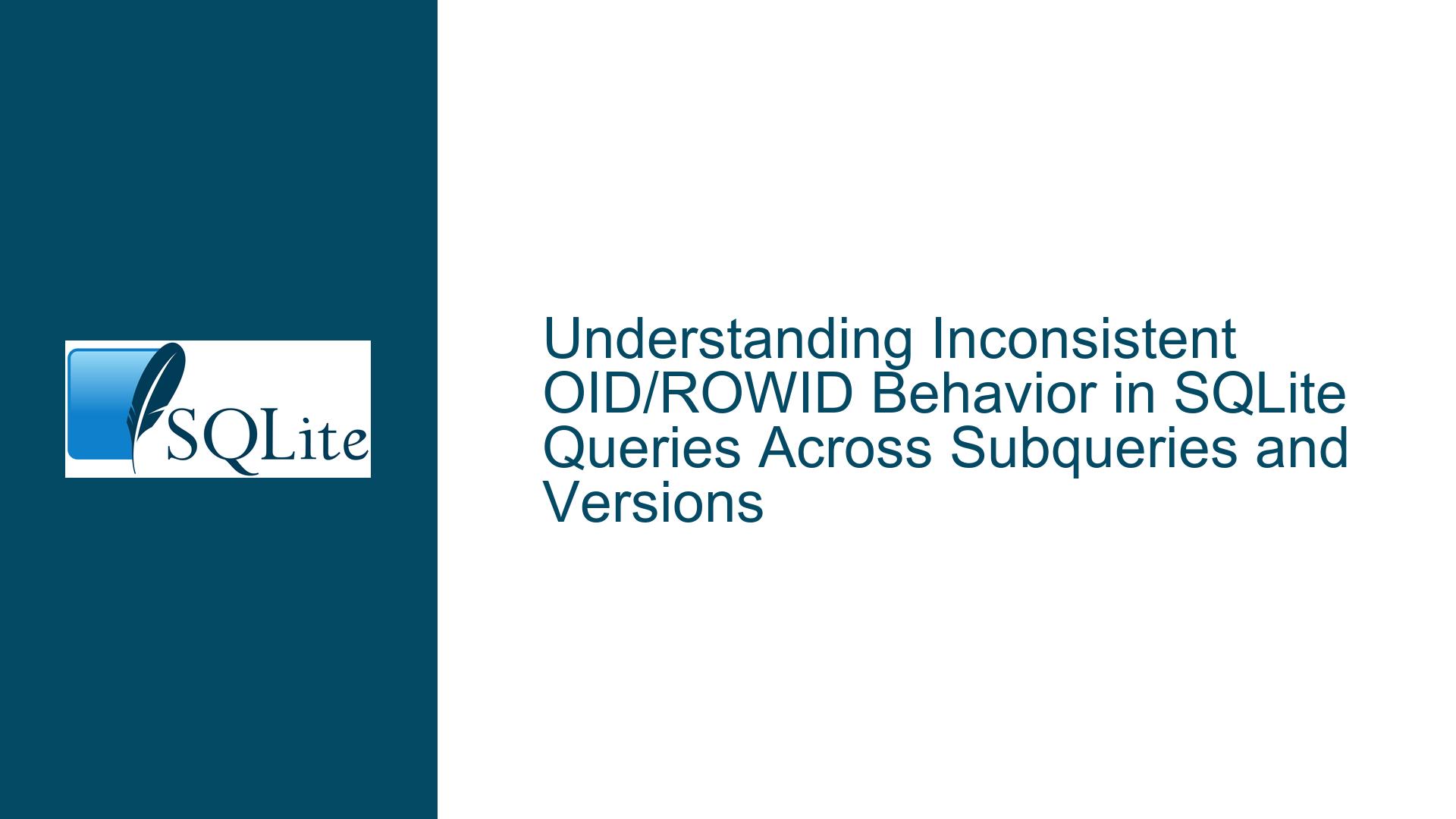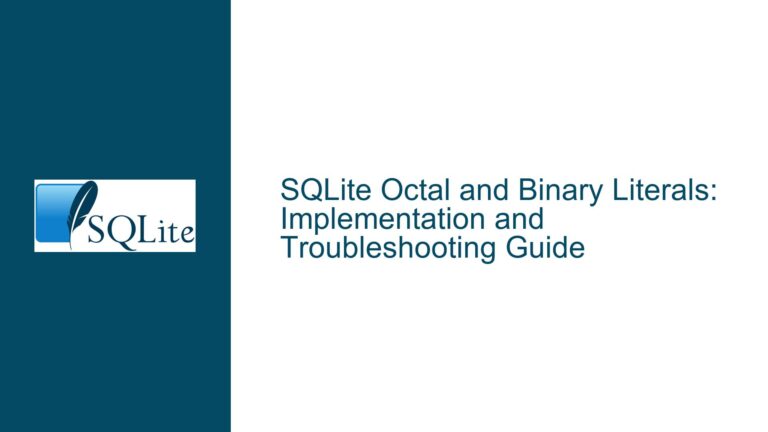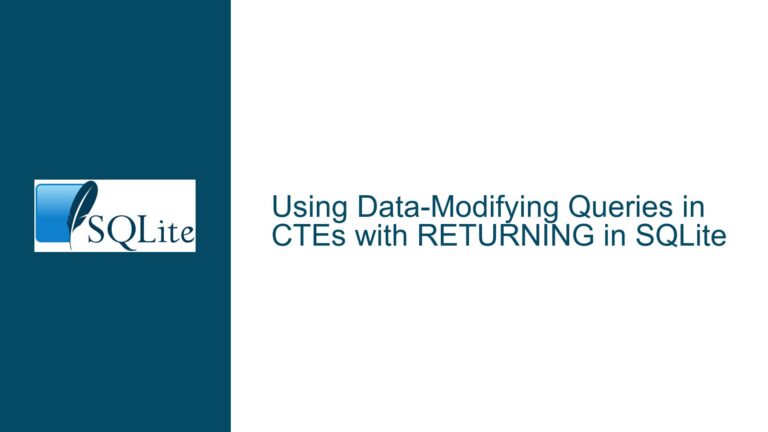Inconsistent OID/ROWID Behavior in SQLite Queries Across Subqueries and Versions
Column Name Resolution and Subquery Processing in SQLite
The core issue revolves around how SQLite handles implicit ROWID/OID references and column name resolution in nested queries. When working with tables that have an INTEGER PRIMARY KEY column (which becomes an alias for the implicit ROWID), SQLite exhibits specific behaviors that change based on query structure and version differences. A table created with id INTEGER PRIMARY KEY makes id, rowid, _rowid_, and oid synonyms for the same value. However, this aliasing behaves differently when queries are nested or when using older SQLite versions (pre-3.39.0). The discrepancy arises from three key factors:
- Automatic column name substitution for ROWID aliases in top-level queries
- Loss of implicit ROWID access in subquery results
- Version-dependent error handling for undefined column references
When executing SELECT oid FROM t_name LIMIT 1, SQLite recognizes oid as an alias for the id column because it’s the declared INTEGER PRIMARY KEY. The result column header becomes id due to automatic substitution. In nested queries like SELECT * FROM (SELECT oid FROM t_name), the outer query operates on the subquery’s result set, which contains an explicitly named column (oid in the second query, no oid in the third). Older SQLite versions allowed implicit ROWID access through magic names even in subqueries, returning NULL when the column didn’t exist, while modern versions throw parse errors for undefined columns.
Impact of SQLite Versions on ROWID/OID Behavior
SQLite’s handling of ROWID/OID references underwent significant changes between versions 3.22.0 and 3.39.0. Pre-3.39.0 versions permitted "magical name" resolution in views and subqueries, leading to inconsistent NULL returns instead of errors. This created confusion when accessing ROWID through aliases like oid in nested queries. Version 3.39.0 introduced stricter column resolution rules where subqueries and views only expose explicitly selected columns, blocking implicit ROWID access through magic names.
The version disparity explains why SELECT oid FROM (SELECT * FROM t_name) returns rowid NULL on Android devices using SQLite 3.8.6/3.22.0 but causes parse errors in 3.39.0. Older implementations treated the subquery as having a phantom ROWID column that wasn’t actually present in the result set, while newer versions enforce column existence checks. This behavioral shift stems from SQLite’s ongoing effort to comply with SQL standards while maintaining backward compatibility with legacy schemas.
Resolving Column Reference Conflicts in Nested Queries
To ensure consistent results across SQLite versions and query structures, apply these solutions:
Explicit Column Aliasing: Instead of relying on magic names like
oid, directly reference theINTEGER PRIMARY KEYcolumn by its declared name (id) in all query levels. For example:SELECT id FROM (SELECT id FROM t_name) LIMIT 1;This eliminates ambiguity in column resolution.
Version-Specific Query Adjustment: If supporting older SQLite versions is necessary, use
_rowid_instead ofoidwhen accessing the implicit ROWID, and always include it explicitly in subqueries:SELECT _rowid_ FROM (SELECT id AS _rowid_, A FROM t_name);Schema Modification for Compatibility: Convert magic ROWID aliases to explicit columns when creating views or CTEs:
CREATE VIEW v_name AS SELECT id AS rowid, A FROM t_name;Then query
rowiddirectly from the view without magic name resolution.Error Prevention in Modern SQLite: Enable strict column mode using
PRAGMA strict=ON;to enforce explicit column declaration. Combine this withCHECKconstraints to validate column existence in subqueries.Query Structure Analysis: Use
EXPLAINorEXPLAIN QUERY PLANto visualize how SQLite processes column references in nested queries. For the problematic querySELECT oid FROM (SELECT * FROM t_name), the explain output in modern SQLite will show the "no such column" error during parsing, while older versions reveal a table scan with NULL ROWID resolution.Migration Path for Legacy Systems: Gradually replace implicit ROWID references with explicit
INTEGER PRIMARY KEYselections. For example, refactor:-- Legacy query SELECT oid FROM (SELECT * FROM t_name); -- Modern equivalent SELECT id FROM (SELECT id, A FROM t_name);This ensures forward compatibility while maintaining functionality.
By understanding SQLite’s column resolution hierarchy (explicit names > magic ROWID aliases > parse errors) and version-specific behaviors, developers can write robust queries that handle ROWID/OID consistently across environments. Always validate the SQLite version using sqlite3_version() or SELECT sqlite_version() and implement conditional query logic if supporting multiple versions is unavoidable.






